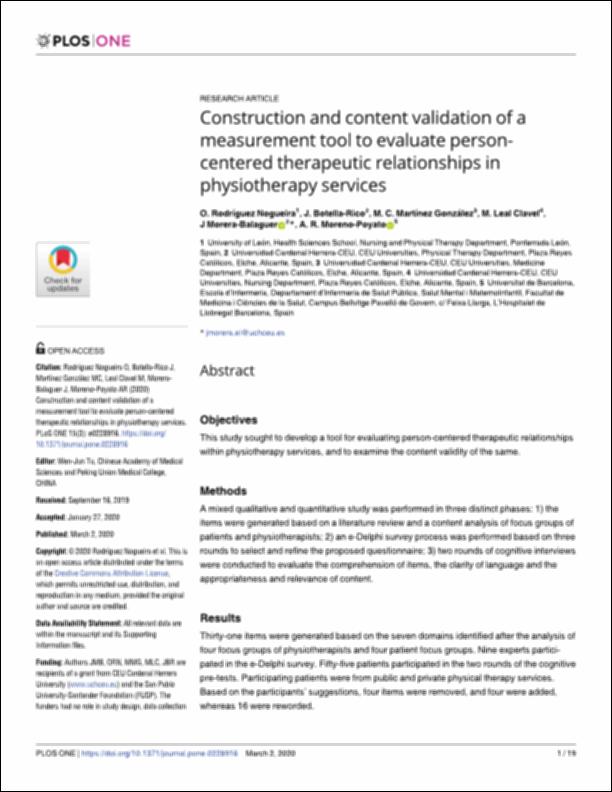Please use this identifier to cite or link to this item:
http://hdl.handle.net/10637/12738Construction and content validation of a measurement tool to evaluate person-centered therapeutic relationships in physiotherapy services
| Title: | Construction and content validation of a measurement tool to evaluate person-centered therapeutic relationships in physiotherapy services |
| Authors : | Rodríguez Nogueira, Óscar Botella Rico, José Martín Martínez González, María Carmen Leal Clavel, Marina Morera Balaguer, Jaime Vicente Moreno Poyato, Antonio R. |
| Keywords: | Psicometría.; Psychometrics.; Physical therapy - Psychological tests.; Physical therapy - Mathematical models.; Fisioterapia - Tests.; Fisioterapia - Modelos matemáticos. |
| Publisher: | PLOS. |
| Citation: | Rodriguez Nogueira, O., Botella-Rico, J.M., Martinez Gonzalez, M.C., Leal Clavel, M., Morera- Balaguer, J. & Moreno-Poyato, A.R. (2020) Construction and content validation of a measurement tool to evaluate person-centered therapeutic relationships in physiotherapy services. PLoS ONE, vol. 15, i. 3, (02 mar.), art. e0228916. DOI: https://doi.org/10.1371/journal.pone.0228916 |
| Abstract: | Objectives This study sought to develop a tool for evaluating person-centered therapeutic relationships within physiotherapy services, and to examine the content validity of the same. Methods A mixed qualitative and quantitative study was performed in three distinct phases: 1) the items were generated based on a literature review and a content analysis of focus groups of patients and physiotherapists; 2) an e-Delphi survey process was performed based on three rounds to select and refine the proposed questionnaire; 3) two rounds of cognitive interviews were conducted to evaluate the comprehension of items, the clarity of language and the appropriateness and relevance of content. Results Thirty-one items were generated based on the seven domains identified after the analysis of four focus groups of physiotherapists and four patient focus groups. Nine experts participated in the e-Delphi survey. Fifty-five patients participated in the two rounds of the cognitive pre-tests. Participating patients were from public and private physical therapy services. Based on the participants’ suggestions, four items were removed, and four were added, whereas 16 were reworded. Conclusions The final tool comprised 31 items divided into seven domains. The response format was based on a 5-point Likert frequency scale. The response options ranged from “strongly agree” to “strongly disagree”. |
| Description: | Este artículo se encuentra disponible en la siguiente URL: https://journals.plos.org/plosone/article?id=10.1371/journal.pone.0228916 |
| URI: | http://hdl.handle.net/10637/12738 |
| Rights : | http://creativecommons.org/licenses/by/4.0/deed.es |
| ISSN: | 1932-6203 (Electrónico). |
| Issue Date: | 2-Mar-2020 |
| Center : | Universidad Cardenal Herrera-CEU |
| Appears in Collections: | Dpto. Enfermería y Fisioterapia |
Items in DSpace are protected by copyright, with all rights reserved, unless otherwise indicated.


